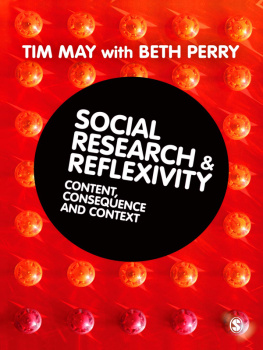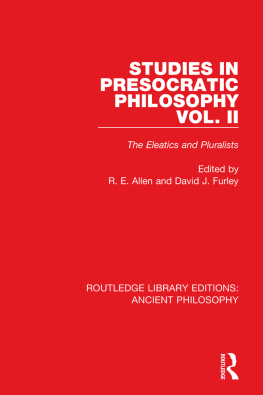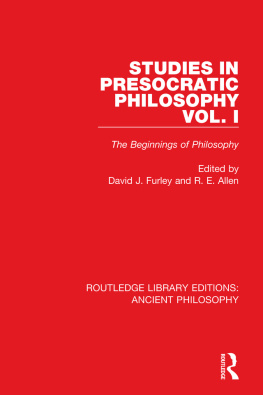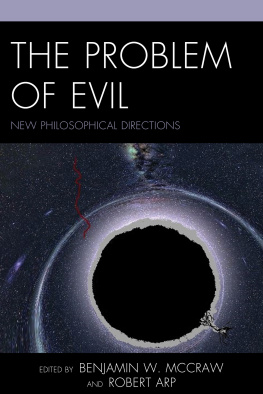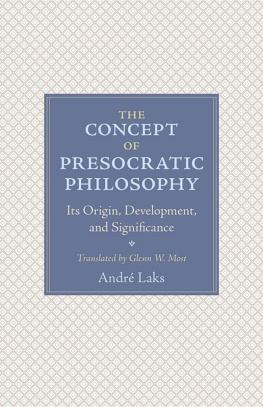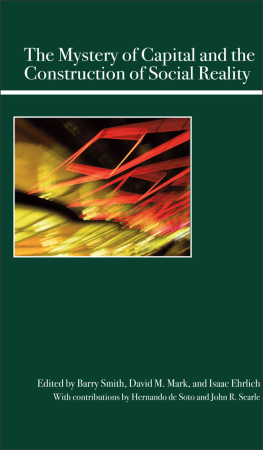PRESOCRATIC REFLEXIVITY: THE
CONSTRUCTION OF
PHILOSOPHICAL DISCOURSE
c. 600450 BC
This is a marvellous example of the authors extraordinary scholarship. No one in the social sciences today has the detailed knowledge of the Presocratic texts displayed here. I cannot emphasize the amount of knowledge and labour that has gone into the authors grasp and reorientation of the textsexemplary in the case of Heraclitus, let alone the rest of the Presocratic texts.
(John ONeill, Distinguished Research Professor of Sociology,
York University, Canada)
the project takes us to the heart of human awareness, the preconditions or self-consciousness of any form of intellectual order. Given the scale and daring of this enterprise it is all the more impressive that Sandywell has continued to write so clearly and with such control over a complex agenda.
(David Chancy, Professor of Sociology, University of Durham)
How did Western philosophy begin? What are the relationships between the construction of self-reflection and the social context and political institutions of ancient Greek society?
In this third volume of Logological Investigations Sandywell continues his sociological reconstruction of the origins of reflexive thought and discourse with special reference to Presocratic philosophy and science and their sociopolitical context.
He begins by criticizing traditional histories of philosophy which abstract speculative thought from its sociocultural and historical contexts, and proposes instead an explicitly contextual and reflexive approach to ancient Greek society and culture.
Each chapter is devoted to a seminal figure or school of reflection in early Greek philosophy. Special emphasis is placed upon the verbal and rhetorical innovations of protophilosophy in the sixth and fifth centuries BC. These chapters are also exemplary displays of the distinctive logological method of cultural analysis and through them Sandywell shows that by returning to the earliest problematics of reflexivity in premodern culture we may gain an insight into some of the central currents of modern and postmodern self-reflection.
Barry Sandywell is Lecturer in the Department of Sociology at the University of York.
First published 1996
by Routledge
11 New Fetter Lane, London EC4P 4EE
This edition published in the Taylor & Francis e-Library, 2003.
Simultaneously published in the USA and Canada
by Routledge
29 West 35th Street, New York, NY 10001
1996 Barry Sandywell
All rights reserved. No part of this book may be reprinted
or reproduced or utilized in any form or by any electronic,
mechanical, or other means, now known or hereafter invented,
including photocopying and recording, or in any information
storage or retrieval system, without permission in writing
from the publishers.
British Library Cataloguing in Publication Data
A catalogue record for this book is available from
the British Library
Library of Congress Cataloguing in Publication Data
A catalogue record for this book has been requested
ISBN 0-203-42480-8 Master e-book ISBN
ISBN 0-203-73304-5 (Adobe eReader Format)
ISBN 0-415-10170-0 (Print Edition)
It is through wonder that men now begin and originally began to
philosophize.
(Aristotle, Metaphysics 982b1012; cf. Plato, Theaetetus
155D25)
And the beginning, as you know, is always the most important part of
any work.
(Plato, Republic II 377A)
What is in the beginning slight becomes in the end of immense importance.
(Aristotle, De Caelo 271b1213)
Die Wehen bei der Geburt neuer Begriffe (The labour pains at the birth of
new concepts).
(Ludwig Wittgenstein, 1980:62)
For Gerard
ABBREVIATIONS
To simplify an already complex text I have deleted all diacritical marks from English transliterations of Greek words. Where possible I have cited Classical works in the Loeb Classical Library edition (which contains both the Greek and English translation). I have followed the standard conventions for citing the works of Plato, Aristotle, Theophrastus, Cicero, and other Classical authors. Further bibliographical information is given in the notes which introduce the main bibliographies. More detailed and extensive bibliographical information can be found in the standard scholarly texts on the Presocratic philosophers and early Greek thought in general (for example Diels and Kranz, 1966 and 1964; Guthrie, 196281; Barnes 1979,1982,1987; Everson, ed., 1990, 1991 and 1994; Long and Sedley, 1987).
Other frequent abbreviations used in the text are as follows:
| Acad. | Cicero, Academica, trans. H.Rackham (London: William Heinemann/Loeb Classical Library, 1933). |
| Atius | Second century AD author; compiler of an eclectic anthology of the opinions of early philosophers, the Placita; these are also reproduced in the pseudo-Plutarchean Epitome and in John Stobaeus Eclogae (in Dox. Gr.). See also DK. |
| Alexander, | Alexander of Aphrodisias, On Aristotle Metaphysics 1, trans. |
| Met. | William E.Dooley (London: Duckworth, 1989). |
| ANET | J.B.Pritchard, ed., Ancient Near Eastern Texts Relating to the Old Testament, 3rd edn (Princeton: Princeton University Press, 1969). |
| An. post. | Aristotle, Analytica Posteriora in The Basic Works of Aristotle, ed. Richard McKeon (New York: Random House, 1941). |
| An. prior. | Aristotle, Analytica Priora, in The Basic Works of Aristotle, ed. Richard McKeon (New York: Random House, 1941). |
| AT | R.Descartes, Oeuvres de Descartes, ed. C.Adam and P.Tannery
(Paris: Librairie Philosophique J.Vrin, 1969). |
| Bywater | Heraclitus of Ephesus: The Fragments of the Work of Heraclitus
of Epheses On Nature, trans. G.T.W.Patrick and Heracliti
Ephesii Reliquiae, trans. I.Bywater Introduction and Bibliography
by L.A.Richards) (Chicago: Argonaut, 1969). |
| CHCL | Cambridge History of Classical Literature (Cambridge: Cambridge University Press, 1989). |
| Cicero, Ref. | Ciceros work, De Re Publica and De Legibus, trans. Clinton
Walker Keyes (London: William Heinemann/Loeb Classical
Library, 1977). |
| Clement | Clement of Alexandria (c. AD 150215). Christian compiler of an anthology or miscellany of pre-Christian philosophers (the Stromata or Miscellanies. |
| De Anima | Aristotle, On the Soul (many editions; especially useful is Aristotle, De Anima, trans. Hugh Lawson-Tancred (Harmondsworth: Penguin, 1986)). |
De. gen.
corrup. | Aristotle, De Generatione et Corruptione (On Generation and Corruption), in R.McKeon, ed., The Basic Works of Aristotle |


